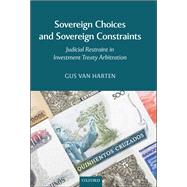Sovereign Choices and Sovereign Constraints Judicial Restraint in Investment Treaty Arbitration
, by Van Harten, Gus- ISBN: 9780199678648 | 0199678642
- Cover: Hardcover
- Copyright: 12/15/2013
Investment arbitrators rely on sovereignty for their legal status just as investor-state disputes usually stem from disagreements about the role of the state in society. As a result, investment arbitration is a vehicle for the exercise of sovereign authority and a site for contesting sovereign choices. This book investigates and evaluates the decision-making record and policy trajectory of international investment arbitration, from theoretical, doctrinal, and empirical perspectives.
It analyzes the extent to which the system used to resolve disputes impacts on the role of government, affecting diverse constituencies, as opposed to limiting itself to case-specific disputes between a single business enterprise and state entity. The book provides a comprehensive review of known awards in order to determine the types of government measures that have triggered disputes. It investigates how investment arbitrators have exercised their authority in recent case law. It provides a review of the approaches adopted in the reasoning of investment treaty tribunals on questions of judicial deference and respect for sovereign decision-makers. In doing so, it determines whether investment tribunals have taken a predominantly assertive approach to investor protection, without regard to their relative lack of accountability, capacity, or proximity in some cases. This approach does not sit comfortably with the relative restraint seen by domestic and international courts in similar
contexts.
The book argues that the unique characteristics of investment treaty arbitration make the experience of domestic judicial review more pertinent to international investment arbitration than to any other contexts for international adjudication. However, it argues that mediating devices in some form should be incorporated into the process in order to solve the tension between the extensive scope and potency of international investment arbitration as an important site of global governance, and the challenges of the review function in reviewing decisions which have strong claims to having comprehensive regulatory expertise, inclusive decision-making, electoral or other public accountability, or greater proximity to the underlying facts and context.
Online Appendices
It analyzes the extent to which the system used to resolve disputes impacts on the role of government, affecting diverse constituencies, as opposed to limiting itself to case-specific disputes between a single business enterprise and state entity. The book provides a comprehensive review of known awards in order to determine the types of government measures that have triggered disputes. It investigates how investment arbitrators have exercised their authority in recent case law. It provides a review of the approaches adopted in the reasoning of investment treaty tribunals on questions of judicial deference and respect for sovereign decision-makers. In doing so, it determines whether investment tribunals have taken a predominantly assertive approach to investor protection, without regard to their relative lack of accountability, capacity, or proximity in some cases. This approach does not sit comfortably with the relative restraint seen by domestic and international courts in similar
contexts.
The book argues that the unique characteristics of investment treaty arbitration make the experience of domestic judicial review more pertinent to international investment arbitration than to any other contexts for international adjudication. However, it argues that mediating devices in some form should be incorporated into the process in order to solve the tension between the extensive scope and potency of international investment arbitration as an important site of global governance, and the challenges of the review function in reviewing decisions which have strong claims to having comprehensive regulatory expertise, inclusive decision-making, electoral or other public accountability, or greater proximity to the underlying facts and context.
Online Appendices






